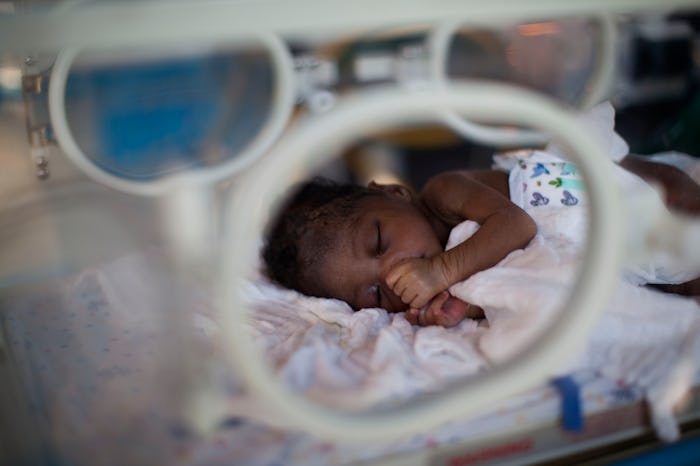Life

8 Surprising Reasons Babies Get Sent To The NICU
When I was pregnant with my first child, I thought only seriously sick babies were sent to the neonatal intensive care unit (NICU). On television and in movies, the NICU is usually reserved for babies who are born pre-maturely or need tubes to breathe and eat. But when my daughter was born, and had to spend a few days in the NICU before she could safely come home from the hospital, I learned that there are a few surprising — and not uncommon — reasons why a baby might go to the NICU.
Per the March of Dimes, babies who are born early or who have a variety of medical conditions might require specialty medical care after they are born. According to the same site, the hospital unit charged with providing this care is called the neonatal intensive care unit (NICU) or special care nursery. Specially-trained doctors, nurses, and therapists will care for newborns until they are ready to be discharged home or to a pediatric unit. Some reasons babies might need extra TLC include being born too small or too early in their gestational development to eat or breathe on their own. Surprisingly, babies who are bigger than average at birth might also be sent to the NICU, especially if their mom had gestational diabetes or they have low blood sugar. Other reasons a baby might be sent to the NICU include not being able to safely ride in a car seat, according to the Children's Hospital of Philadelphia, or if they aren't feeding well.
Having a baby in the NICU can be frightening and stressful, but it's the best place for babies to receive the care they need to head home with you from the hospital. To learn more about why your baby might get sent to the NICU, read on:
Their Blood Sugar Is Too Low
Per the March of Dimes, babies might be sent to the NICU if their blood glucose falls below 50 mg/dL — a condition also known as hypoglycemia. As Stanford Children's Health notes, babies born to parents with gestational diabetes, born at higher than average weights, who experience stress during labor or delivery, or who don't feed well are at high risk for hypoglycemia.
Maintaining stable blood sugar in the first few days of life is super important for brain development and growth, according to the same site, so if your baby's blood glucose measures too low your doctor might recommend a stay in the NICU for I.V., glucose, feeding, and monitoring.
They Have Trouble Getting Warm
Some babies have trouble maintaining a safe body temperature after birth, according to the March of Dimes. Sometimes simply holding your baby skin-to-skin can rectify the situation. Other times, however, your baby can benefit from sleeping in a warmer and having their temperature continuously monitored with a thermometer, just to make sure they stay safe and warm.
They Have Trouble Feeding
While feeding comes naturally for some babies, according to the March of Dimes, babies who are born prematurely or who are too little or sick to latch onto a breast or bottle may need to be admitted to the NICU so they can be administered a feeding tube. That tube will provide them with nourishment until they are big or healthy enough to eat on their own.
They Fail Their "Car Seat Test"
If your baby is born early or needs medical help to breathe, they will likely need to pass a "car seat test," or tolerance test, before they are discharged to go home, per Children's Hospital of Philadelphia. For your baby's doctors to be sure that it's safe for them to ride in their car seat, at an incline, they will need to sit in the seat for 90 to 120 minutes
They Are Big Babies
While I always associated the NICU with tiny babies, big babies might also need a NICU stay, too. According to the March of Dimes, babies born at weights of 9 pounds, 14 ounces or more (called macrosomia) might be admitted to the NICU for additional monitoring of their blood sugar and to make sure they are getting enough nourishment to stay healthy.
They've Lost Weight
According to the Fed is Best Foundation, it's normal for newborns to lose between 3 to 7 percent of their birth weight before they leave the hospital. If they lose more than that, however, they need to be evaluated by a medical professional and may need to receive supplemental feeds until your milk comes in (if you want to and are able to breastfeed). That care may include a stay in the NICU, especially if they don't start re-gaining weight by day five, according to the same site. That stay will make sure there's not an underlying medical problem that requires treatment.
They Have Jaundice
According to research published in the journal Pediatrics, newborn jaundice — also called hyperbilirubinemia — is one of the leading causes of hospital re-admission for newborns, especially those who are breastfed. Stanford Children's Health notes that hyperbilirubinemia occurs when a baby's liver isn't effective at removing a substance called bilirubin from their blood. Mild jaundice can resolve on it's own, but if a baby isn't feeding well or doesn't pass stool, they may need to receive phototherapy (literally laying under or on special lights), I.V. fluids, or medications to help.
Their Mom Is Sick
Sometimes a baby looks or acts sick following birth, but others, as Pankaj Nagaraj, MD, told UnityPoint Health, their mom's health is the first sign of a problem. If their gestational parent has signs of an infection called chorioamnionitis — including a fever, high heart rate, or a sore uterus after birth — they may be admitted to receive antibiotics for 48 hours before they can go home from the hospital.